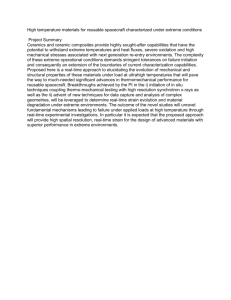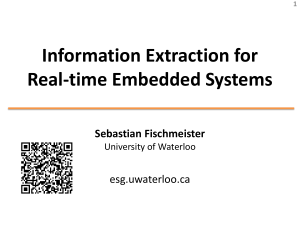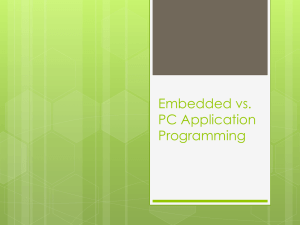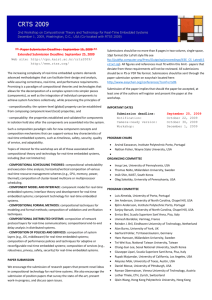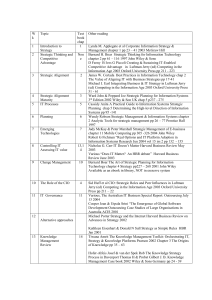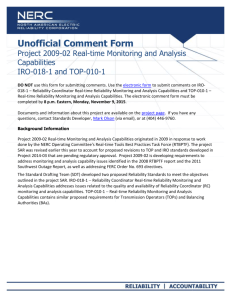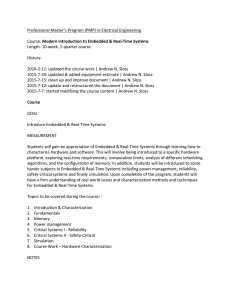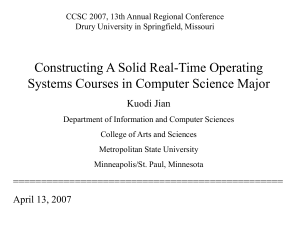Course Syllabus - UW Faculty Web Server
advertisement
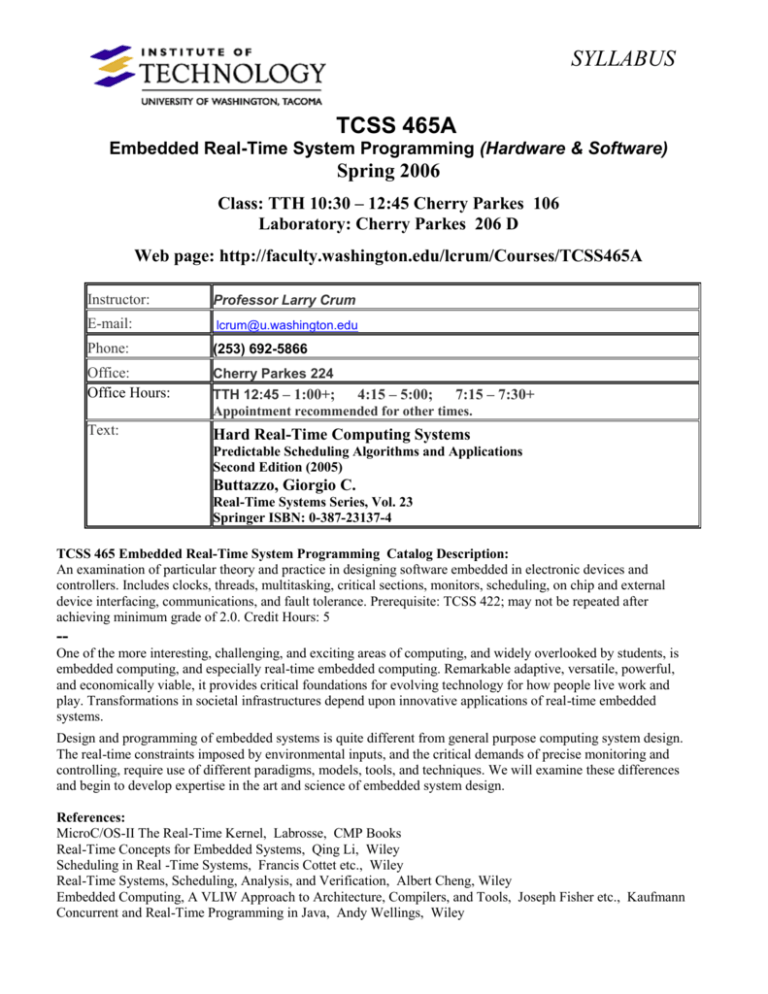
D SYLLABUS TCSS 465A Embedded Real-Time System Programming (Hardware & Software) Spring 2006 Class: TTH 10:30 – 12:45 Cherry Parkes 106 Laboratory: Cherry Parkes 206 D Web page: http://faculty.washington.edu/lcrum/Courses/TCSS465A Instructor: Professor Larry Crum E-mail: lcrum@u.washington.edu Phone: (253) 692-5866 Office: Office Hours: Cherry Parkes 224 Text: Hard Real-Time Computing Systems TTH 12:45 – 1:00+; 4:15 – 5:00; 7:15 – 7:30+ Appointment recommended for other times. Predictable Scheduling Algorithms and Applications Second Edition (2005) Buttazzo, Giorgio C. Real-Time Systems Series, Vol. 23 Springer ISBN: 0-387-23137-4 TCSS 465 Embedded Real-Time System Programming Catalog Description: An examination of particular theory and practice in designing software embedded in electronic devices and controllers. Includes clocks, threads, multitasking, critical sections, monitors, scheduling, on chip and external device interfacing, communications, and fault tolerance. Prerequisite: TCSS 422; may not be repeated after achieving minimum grade of 2.0. Credit Hours: 5 -One of the more interesting, challenging, and exciting areas of computing, and widely overlooked by students, is embedded computing, and especially real-time embedded computing. Remarkable adaptive, versatile, powerful, and economically viable, it provides critical foundations for evolving technology for how people live work and play. Transformations in societal infrastructures depend upon innovative applications of real-time embedded systems. Design and programming of embedded systems is quite different from general purpose computing system design. The real-time constraints imposed by environmental inputs, and the critical demands of precise monitoring and controlling, require use of different paradigms, models, tools, and techniques. We will examine these differences and begin to develop expertise in the art and science of embedded system design. References: MicroC/OS-II The Real-Time Kernel, Labrosse, CMP Books Real-Time Concepts for Embedded Systems, Qing Li, Wiley Scheduling in Real -Time Systems, Francis Cottet etc., Wiley Real-Time Systems, Scheduling, Analysis, and Verification, Albert Cheng, Wiley Embedded Computing, A VLIW Approach to Architecture, Compilers, and Tools, Joseph Fisher etc., Kaufmann Concurrent and Real-Time Programming in Java, Andy Wellings, Wiley Grading: Projects (40%), Midterm (20%) Final Exam (25%), Class Contribution (15%) Characteristics of an A student – Work done is outstanding quality and shows particular insight and creativity. It is consistently presented very professionally. Characteristics of a B student – Work done is complete, predominance of it is correct, and it is presented professionally. Characteristics of a C student – Work is basically complete and correct, and it is presented coherently and completely. The student is prepared to use the material in the next course but will likely need more study in the area. Laboratory: We will do hands-on projects in our laboratory (CP 206D). Plagiarism: Students are encouraged to collaborate with their colleagues on understanding assignments and gaining insight on solutions. However, any significant contribution in a submission must be acknowledged and the responsible student or source given due credit. See http://depts.washington.edu/grading/issue1/honesty.htm . Schedule (Subject to modification due to unforeseen lab challenges): Week 1: Mar 28 - 30 2: Apr 4 - 6 3: Apr 11 - 13 4: Apr 18 - 20 5: Apr 25 - 27 6: May 2 - 4 7: May 9 - 11 8: May 16-18 Tuesday Hard Real-Time Computing Systems Thursday ColdFire - NetBurner Chap 1 - General Overview & Introduction to the Cold Fire Processor & Chap 10 - Application Design Issues the NetBurner Example progs–Exploring the NetBurner Programs that exercise the standard I/O devices Chap 2 – Basic Concepts Chap 3 – Aperiodic Task Scheduling Chap 4 – Periodic Task Scheduling Midterm Chap 5 – Fixed-Priority Servers Chap 6 – Dynamic Priority Servers Digital I/O, Scopes, timing of real-time programs Architecture of the ColdFire processor Assembly language Interrupts Device programming Feedback loops Chap 7 – Resource Access Protocols 10: May 30 - Jun 1 Chap 8 – Handling Overload Conditions Demonstrations 11: - - Final Exam 10:30 – 12:45 9: May 23 - 25 Jun 8 Individual projects Safety Escorts: Safety escorts are available to accompany you to your vehicle 24 hours a day, 7 days a week. Call Campus Safety at 2-4416 from a campus phone, and 253-692-4416 from a non-campus phone. Reporting Emergencies: From campus phones, report emergencies by dialing 9-911 and state the T-number that is on a sticker on the phone; from non-campus phones dial 911. Building location numbers are posted on all buildings. For assistance with nonemergencies call Campus Safety at 2-4416 from a campus phone, and 253-692-4416 from a non-campus phone. Emergency Procedures: In case of emergency, follow your professor’s instructions. When an alarm sounds, evacuate the building immediately. MATT, CP, WG, GWP, and BB buildings assemble in the Cragle Parking Lot south of the library. BHS, WCG, and DOU buildings assemble near the transit station next to the Pinkerton Building on Broadway (across from Spaghetti Factory). Pinkerton occupants go to the convention center parking lot north of Pinkerton. For more information about emergency procedures and information, please go to: http://www.tacoma.washington.edu/safety/ Disability Support: If you would like to request academic accommodations due to a temporary or permanent disability, contact Lisa Tice, Manager for Disability Support Services (DSS) in the Mattress Factory Bldg, Suite 206. An appointment can be made through the front desk of Student Affairs (692-4400), through Student Development and Success (692-4501), by phoning Lisa directly at 692-4493 (voice) or 692-4413 (TTY), or by e-mail ltice@u.washington.edu. Appropriate accommodations are arranged after you've conferred with the DSS Manager and presented the required documentation of your disability to DSS.

